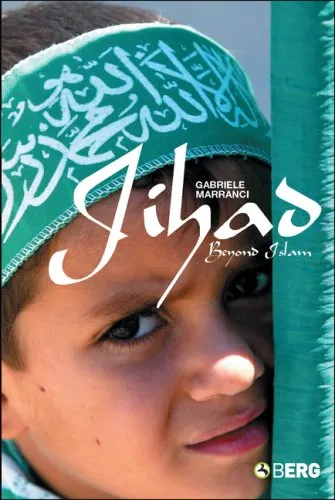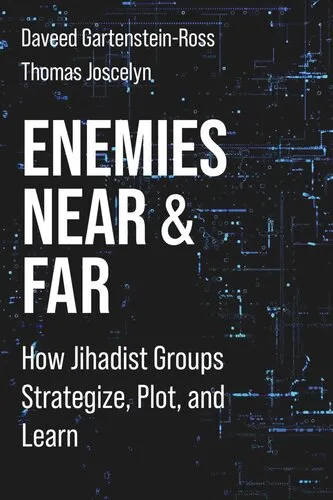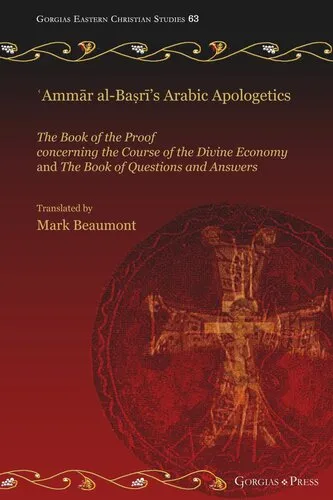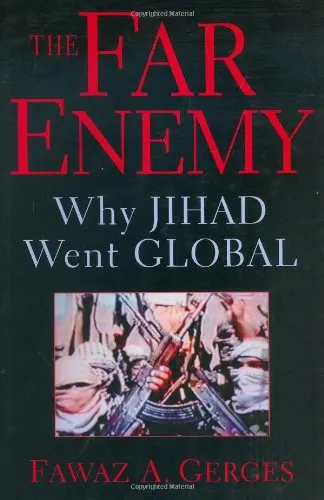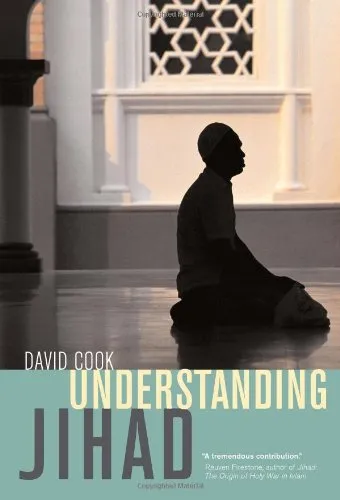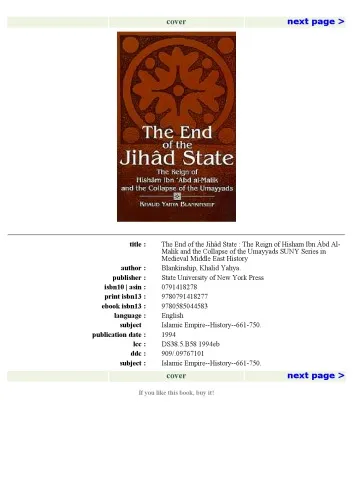Jihad Beyond Islam
4.0
بر اساس نظر کاربران

شما میتونید سوالاتتون در باره کتاب رو از هوش مصنوعیش بعد از ورود بپرسید
هر دانلود یا پرسش از هوش مصنوعی 2 امتیاز لازم دارد، برای بدست آوردن امتیاز رایگان، به صفحه ی راهنمای امتیازات سر بزنید و یک سری کار ارزشمند انجام بدینRelated Refrences:
معرفی کتاب «Jihad Beyond Islam»
«Jihad Beyond Islam» اثری برجسته از گابریله مارانچی، پژوهشگری برجسته در زمینهٔ انسانشناسی و مطالعات اسلامی است. این کتاب با بهرهگیری از رویکردی انسانشناسانه، مفهومی گستردهتر و عمیقتر از Jihad را ارائه میدهد که فراتر از برداشتهای عمومی و رسانهای است. هدف کتاب شکستن کلیشهها و تصورات رایج درباره مفهوم Jihad در اسلام است.
خلاصهای از کتاب
کتاب «Jihad Beyond Islam» تلاش میکند Jihad را بهعنوان بخشی از هویت فرهنگی و معنوی مسلمانان بررسی کند و آن را از تفسیرهای صرفاً سیاسی یا ایدئولوژیک متمایز کند. مارانچی از دیدگاه انسانشناسی تحلیلی به مسئله Jihad نزدیک میشود و با بررسی نمونههایی از جوامع مختلف مسلمان، این مبحث را به شکلی پویا و چندبعدی توضیح میدهد.
نویسنده تأکید میکند که Jihad تنها به معنای «جنگ در راه خدا» نیست، بلکه مجموعهای از مفاهیم اخلاقی، اجتماعی و معنوی را در بر دارد که نقش مهمی در تعریف هویت فردی و جمعی مسلمانان دارد. این کتاب همچنین بررسی میکند که چگونه برداشتهای نادرست از Jihad در رسانهها و سیاستهای جهانی منجر به سوءتفاهمهای فراوانی درباره اسلام شده است.
مارانچی در این کتاب مقولاتی مانند نقش احساسات، زمینههای فرهنگی و اجتماعی، و هویت شخصی در شکلگیری مفهوم Jihad را تجزیه و تحلیل میکند. او تلاش میکند با ارائه شواهد و دیدگاههای متنوع، پیچیدگی این مفهوم را برجسته کرده و آن را فراتر از نگاههای تکبعدی بسط دهد.
نکات کلیدی کتاب
- Jihad یک مفهوم پویا و چندلایه است که بسته به زمان، مکان و فرهنگ، معانی متفاوتی پیدا میکند.
- تعاریف رایج و کلیشهای از Jihad که اغلب در رسانهها دیده میشود، بهطور جدی ناقص و گمراهکننده هستند.
- رویکردهای انسانشناسانه، ابعاد عمیقتر و انسانی Jihad را روشن میکنند.
- احساسات، هویت و زمینههای اجتماعی ـ فرهنگی نقش مهمی در فهم رفتارها و دیدگاههای مسلمانان نسبت به Jihad دارند.
- گفتگوی میانفرهنگی و درک متقابل، کلید حل سوءتفاهمهای جهانی درباره مسائل مربوط به Jihad است.
جملات معروف از کتاب
«Jihad چیزی فراتر از جنگ است؛ مفهومی است که از عمیقترین لایههای اعتقادی و هویتی مسلمانان سرچشمه میگیرد.»
«برای درک Jihad، باید به دلایل احساسی، روانشناختی و زمینههای فرهنگی آن نگاه عمیقتری داشت.»
«تنها راه برای از بین بردن سوءتفاهمها درباره Jihad، رهایی از کلیشهها و شناخت ماهیت پیچیده آن است.»
چرا این کتاب اهمیت دارد؟
«Jihad Beyond Islam» نهتنها برای محققان و دانشجویان علوم انسانی و اسلامی، بلکه برای هر فرد علاقهمند به فهم عمیقتر اسلام و مسلمانان اهمیت دارد. این کتاب کمک میکند تا تصورات نادرست کنار گذاشته شوند و دیدگاههای جامعتر و انساندوستانهتری درباره مسلمانان و فرهنگشان به دست آید.
در زمانی که مفاهیم اسلامی اغلب در سیاستهای جهانی سوء استفاده میشوند، این کتاب فرصتی برای گشایش بحثهایی علمی، بیطرفانه و مبتنی بر شواهد فراهم میکند. مطالعه این اثر میتواند تأثیر مثبتی بر بهبود دیالوگهای میانفرهنگی داشته باشد و درک متقابل میان انسانها را تقویت کند.
بهطور خلاصه، این کتاب پلی است میان اسلام واقعی و تصورات اشتباه رایج در جهان معاصر.
Introduction
Jihad Beyond Islam, authored by Gabriele Marranci, delves into one of the most misunderstood and controversially debated topics of our era: jihad. Rather than reiterating conventional narratives or media-driven stereotypes, the book seeks to deconstruct and analyze jihad through a multidimensional lens. By exploring the emotional, sociopolitical, and existential factors that drive individuals to engage with this concept, Marranci challenges readers to move beyond simplistic assumptions and understand jihad as a nuanced and dynamic phenomenon, deeply rooted in individual and cultural contexts.
This groundbreaking book goes beyond mere historical or theological delineations of jihad. Marranci employs an anthropological approach, combined with in-depth fieldwork and personal interviews, to reveal the personal and emotional dimensions that inform and shape the meaning of jihad for Muslims worldwide. The author argues against monolithic views of Islam and its practices, urging a profound reconsideration of how various social, emotional, and existential realities create diverse meanings of jihad. The book not only confronts biases within Western discourses but also critiques how Muslims themselves engage with and interpret this contested concept.
Detailed Summary of the Book
At its core, Jihad Beyond Islam seeks to transcend the narrow and often polarizing definitions of jihad as either an act of violence or spiritual devotion. The author introduces readers to the diversity of interpretations surrounding the concept, avoiding blanket definitions and focusing instead on the human experiences and emotions that give it meaning in various contexts.
The book begins with an overview of the traditional scholarly interpretations of jihad, juxtaposing them with modern, politicized understandings. However, it quickly departs from this conventional analysis and steps into the realm of anthropology. By emphasizing personal narratives, Marranci highlights how feelings of alienation, injustice, or moral duty compel individuals to conceptualize jihad in ways that resonate with their lived realities.
Through compelling personal accounts, Marranci captures the deep emotional resonance jihad holds for different individuals. From spiritual seekers to those engaged in armed struggles, the book portrays jihad as a flexible and adaptive concept, one that is molded by personal experiences, cultures, and emotional states. The author also devotes significant attention to how Western socioeconomic and political dynamics foster certain extremist interpretations of jihad, framing it as a defensive act against perceived injustices.
The book’s anthropological approach sets it apart, as it scrutinizes how everyday life and existential anxieties intersect with religious identity to create a rich and complex tapestry of meanings for jihad. Marranci contends that to understand jihad fully, one must recognize the importance of emotions, relationships, and individual agency in shaping its interpretations. By doing so, Jihad Beyond Islam opens the door to new ways of thinking about Islam and its practices in contemporary societies.
Key Takeaways
- The concept of jihad cannot be confined to rigid definitions; it is highly contextual and deeply personal.
- Anthropological and emotional perspectives are essential for understanding the motivations and experiences behind those who engage with the idea of jihad.
- Religious practices like jihad are often shaped by external sociopolitical pressures, existential crises, and emotional vulnerabilities.
- Simplistic or monolithic views of Islam and jihad risk perpetuating misunderstandings and stigmas that hinder global relations.
- Engagement with authentic personal narratives and lived experiences can help deconstruct stereotypes and open avenues for dialogue and tolerance.
Famous Quotes from the Book
"Jihad is neither an essence nor a singular concept. Rather, it is a multifaceted and adaptive notion that finds its meanings not in texts, but in the lives of individuals."
"To understand jihad, one must delve beyond the doctrinal and into the emotional and existential. It is here, in the hearts of men and women, that its true meanings are born."
"The struggle for identity and dignity is what often transforms jihad from a scriptural ideal into a lived reality."
Why This Book Matters
Jihad Beyond Islam is a crucial contribution to modern Islamic studies, offering a fresh and empathetic perspective on one of the most often misinterpreted concepts in Islam. By shifting the conversation from abstract debates toward the human and emotional dimensions of jihad, Marranci encourages readers to engage with the subject without the distortions of fear or prejudice. This approach fosters greater understanding between Muslim and non-Muslim communities and challenges the rhetoric often employed by extremists and sensationalist media alike.
In a world increasingly polarized by religious and cultural misunderstandings, the book provides a vital tool for scholars, policymakers, and everyday readers seeking to bridge divides. It dismantles stereotypes and equips readers with the knowledge and insight to engage in more meaningful, informed discussions about Islam and its diverse practices. In doing so, Jihad Beyond Islam not only enriches academic discourse but also contributes to fostering a more inclusive and compassionate world.
دانلود رایگان مستقیم
شما میتونید سوالاتتون در باره کتاب رو از هوش مصنوعیش بعد از ورود بپرسید
دسترسی به کتابها از طریق پلتفرمهای قانونی و کتابخانههای عمومی نه تنها از حقوق نویسندگان و ناشران حمایت میکند، بلکه به پایداری فرهنگ کتابخوانی نیز کمک میرساند. پیش از دانلود، لحظهای به بررسی این گزینهها فکر کنید.
این کتاب رو در پلتفرم های دیگه ببینید
WorldCat به شما کمک میکنه تا کتاب ها رو در کتابخانه های سراسر دنیا پیدا کنید
امتیازها، نظرات تخصصی و صحبت ها درباره کتاب را در Goodreads ببینید
کتابهای کمیاب یا دست دوم را در AbeBooks پیدا کنید و بخرید
1486
بازدید4.0
امتیاز0
نظر98%
رضایتنظرات:
4.0
بر اساس 0 نظر کاربران
Questions & Answers
Ask questions about this book or help others by answering
No questions yet. Be the first to ask!
